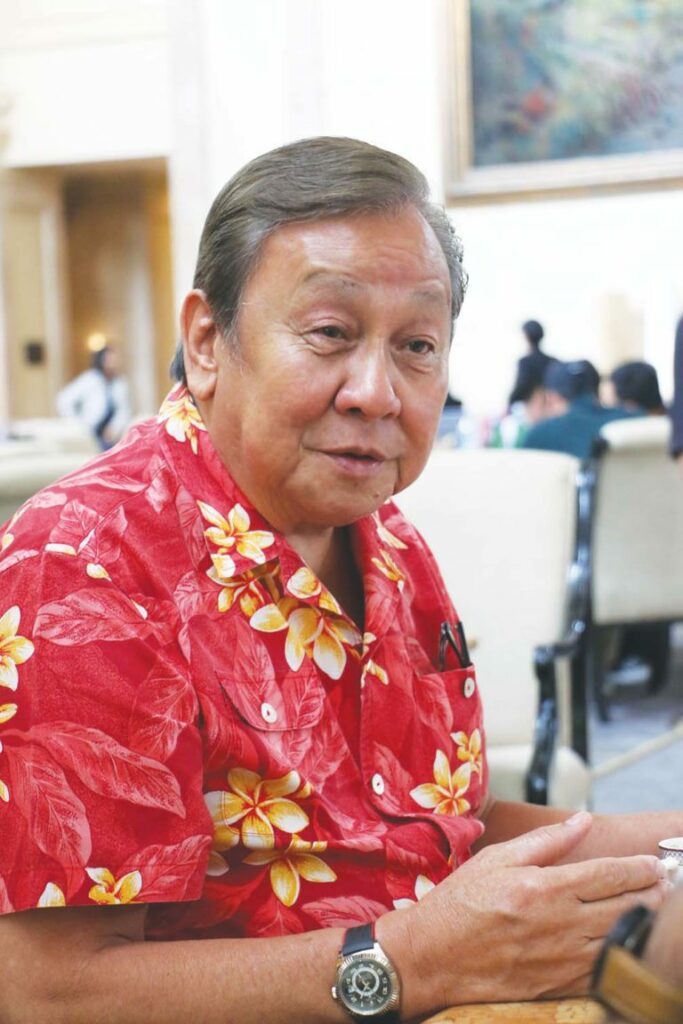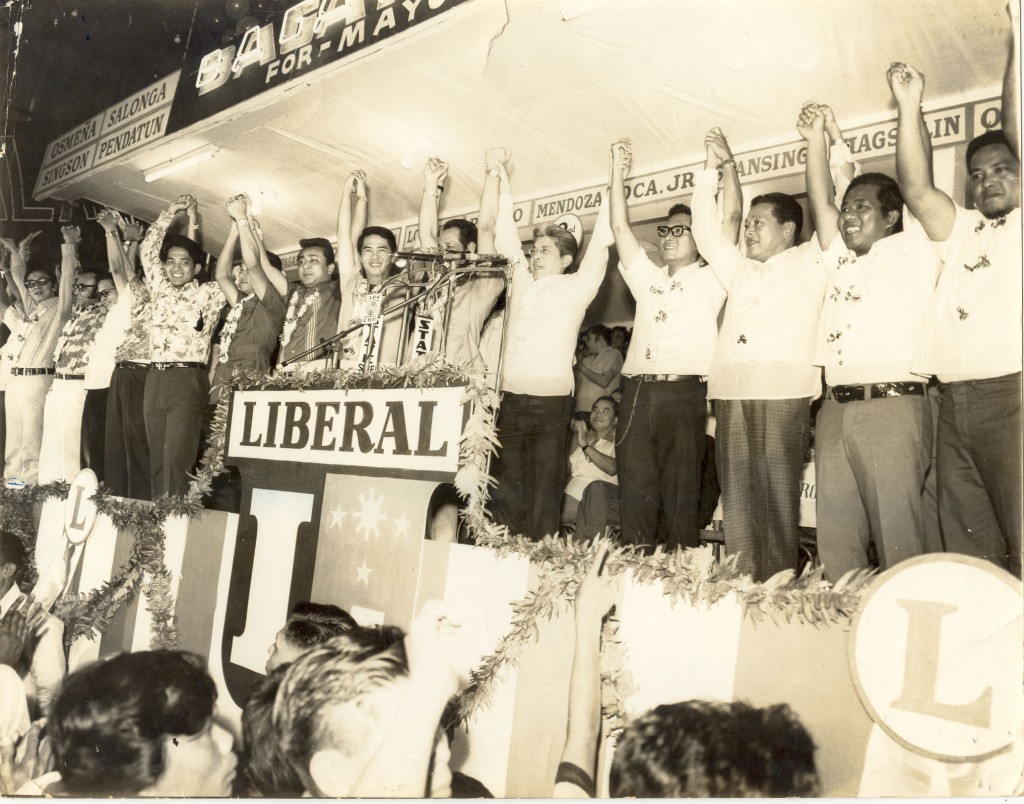Fifty years ago, on the night of Aug. 21, 1971, two grenades were lobbed at a Liberal Party rally at Manila’s iconic Plaza Miranda, killing nine people and nearly wiping out the then-opposition’s top guns.
Among the wounded: Jovito Salonga, who would become the post-Edsa’s first Senate president despite his serious injuries; LP president Gerardo Roxas; Senators Eddie Ilarde and Eva Estrada Kalaw. John Osmeña, who would also become senator after Edsa; then-Palawan congressman Ramon V. Mitra Jr., Councilor Ambrosio “King” Lorenzo Jr., and the LP candidates for mayor and vice mayor, Ramon Bagatsing Sr. and Martin B. Isidro.
Beyond the carnage, however, it was the wound to the national soul and the damage to democracy that has taken the longest to heal, according to one of the survivors—the only survivor still alive today among the notable politicians on that ill-fated stage.
Now 80 years old, veteran public servant Lito Atienza, who was 30 and an aspiring councilor, shared with the BusinessMirror his recollection of the blast and, more tellingly, how it scarred Philippine politics.
“Plaza Miranda bombing is one of the biggest crimes in our country that remains unresolved. [It is in the mold of] the Ninoy Aquino assassination, the Mendiola Massacre, the many other bombings and killings, and even recently, that dastardly kidnapping and killing of the Korean businessman from Pampanga, who was killed right inside Camp Crame—established as done by cops—and his body cremated and flushed down the toilet,” Atienza said in an interview.
“Our pattern of political violence—and worse, inability to resolve many of the incidents—continues to hound our struggle for democratic restoration and political maturity,” he added.
Whatever the truth as to who was behind it—the two main theories putting the blame on then president Ferdinand Marcos and later, on communist leader Jose Maria Sison, Atienza said, “Plaza Miranda placed the whole democratic system in jeopardy, because Marcos used it as an excuse for declaring a state of emergency, suspending the writ of habeas corpus, and eventually declaring martial law…. It introduced an avenue for grabbing power.”
It also, he added, paved the way for an authoritarian regime that enabled “corruption, caused institutional damage [that until now we have yet to completely rebuild or correct].”
Until now, 50 years later and 35 years after the Edsa revolt that ousted the Marcos dictatorship, Filipinos struggle at nation-building and at restoring damaged institutions, lamented Atienza, who recently turned 80 and is one of the few leaders who lived through the years of transition and whose public service straddled both the Executive and the Legislative, local and national offices.
THE FATEFUL NIGHT
August 21, 1971, was the LP Proclamation Night for its senatorial and local candidates in Manila: Bagatsing Sr. for mayor and Isidro for vice mayor.

Atienza recalled those moments: “It was my first try at politics, running for councilor in the party that my forebears had cofounded.
“I was standing near the rightmost part of the stage, and we were raising our arms for the photo-op. Seconds after we were proclaimed, I saw something, wrapped in newspaper, thrown in the direction of the stage. The newspaper came undone, was separated from the object. Miraculously, the trajectory of that object was affected when it hit a metal object—I recall it was the stand of a TV crew’s camera. I still remember the faint sound of metal against metal, as the object, or what turned out to be the first grenade, hit the metal post, and thus fell right below the stage near our side. By that time, we were already seated. I survived because it did not land onstage. But the blast was so strong we were thrown back with our chairs. In an instant, I saw blood all over me; my partymates, friends, all wounded; I myself was covered in blood. Then it dawned on me there might be another one. I had the presence of mind not to stand up at once. True enough, a second grenade landed onstage. I would later realize this second grenade was the one that injured most of the LP leaders onstage.”
The current senior deputy speaker said he heard what sounded like gunshots and “I thought to myself, ‘this was a massacre. These people are out to kill all of us onstage.’ So I did not move, and that must have saved me.”
He heard people rushing, in a stampede, “but still I lay down on stage, even though some people were running over me.
“After some time, I and Lito Osmeña saw John Osmeña, his brother, and we commandeered a vehicle and brought John to Manila Doctors Hospital.”
After tending to John [who was seriously wounded and would undergo years of treatment and rehabilitation], the doctors checked Atienza thoroughly. Even though he was covered in blood, doctors did not find any wound or injury, and one of them told him, “you just experienced a miracle. You are completely unhurt.”
Later, Atienza recalled, one of his doctor friends suggested he put bandage on any part of his body, since all of the LP group was continuing the campaign, all manifesting some injury—a cast here, a bandage there. Bagatsing, one of those most seriously injured, appeared on a wheelchair as he had lost a leg. He won by a landslide over the incumbent, the very popular and experienced mayor Antonio Villegas.
Atienza, then 30 years old, lost that election, and some well-meaning friends said it was probably because he did not have any injury and thus did not attract sympathy.
“But I didn’t mind it then. To me, the most important lesson from there was that God had spared me from death or injury for something else perhaps.”
Another key takeaway: “I realized then that rather than be cowed, or cowering in fear, I have to remain in politics, endure all this, and discern as much as I can what I must do with God’s guidance.
“Nung gabing ’yun, nawala lahat ang takot ko [That night, I lost all fear].”
That fearlessness became useful in 1983, when nationwide protests erupted after the Ninoy Aquino assassination. He would get caught up in the swirl of protests and was prodded to run under the opposition banner in the 1984 election for assemblymen in the Interim Batasang Pambansa.
“I couldn’t have joined, or identified with the ruling KBL. The chance fell on us to contest the ruling party of Marcos,” so he tried his luck in an uphill campaign—with no funds, with so many risks, physical and otherwise.” His father, the consummate public servant Jose “Lolo Pepe” Atienza, advised him to think well about it, given the quixotic campaign. Atienza recalled telling his father, “It’s not a matter of whether I win or lose, since I know they will cheat. For me to be able to explain the issues of the day is enough.” Atienza said he had by then projected the number of meetings he could call, the number of people he could reach during the campaign.
Of course, the nightmare of Plaza Miranda 12 years earlier was still in his mind, so he planned his meetings and campaign sorties—8 meetings nightly, from 6 pm to 4 am—with security precautions. “I was always conscious of threats, my eyes on alert, each time we were speaking onstage. One time, I was so passionate in my speech and so concentrated on my message that I accidentally hit the microphone stand and the mic smashed into my face. For a brief second, I thought, I had been hit by a grenade or something,” Atienza recalled with self-deprecating chuckle.
He recalled how, “wherever we went, people waited for us. Many times they put up improvised stages—plywood placed across several metal drums.”
The 1984 Batasan campaign was the “most beautiful campaign I’ve ever been in. Because people came to our meetings without any expectation, without asking for anything, but just eager to hear what we had in mind on the issues of the day.”
He started the campaign with zero funds, but along the way, people helped out with donations in cash and in kind. Outside his home in San Andres Bukid, Manila, a truckload of eggs once arrived, and at one time, there was a truckload of softdrinks.
An amusing recollection: a friendly neighborhood bumbay, those Indian businessmen—a fixture in many Philippine cities, peddling household goods like mosquito nets, thermos bottles, aluminum containers, on installment or lend out money—once came to his house early and quietly left a small envelope with P1,000. “He was known as a tightwad, so when he donated to our campaign, I treasured that.”
Atienza noted how, in contrast to the cash-starved 1984 campaign of the opposition—where six Metro Manila assemblymen including Atienza trounced the KBL, the administration was so literally “cash-rich” that in 1986, at the celebrated walkout by the opposition lawmakers from the Batasan which proclaimed Ferdinand Marcos winner of the snap elections despite allegations of fraud, “they rained down money on us.” The gallery had been pre-filled with hundreds of people herded by the Metro Manila Commission, and when the opposition MPs walked out, they hurled those then-huge one-peso coins, hitting many in the head.
“Inulan kami ng pera [money rained on us], pero masakit, a, kasi ang laki ng piso nuon,” Atienza recalled, adding, he’d prefer being hit by a huge coin anytime than a grenade.
TAKEAWAYS FOR YOUNG LEADERS
Having survived Plaza Miranda and martial law, when he was twice detained, and lived through several political eras, does he have a message for the young, given the game-changing trend in 2019 that saw several youthful leaders trouncing established dynasties?
“The young of today should not be discouraged. Don’t be discouraged if you don’t have money,” but are nonetheless qualified and have something good to offer people, he said. “If you have the qualifications, the ideals, and the communication skills, communicate with people” and let them know “your vision and your plans.”
Money “helps in any campaign, but is not the primary requirement,” he added.
As for his own decades in public service, he noted that it was during the times he had made much effort at discerning “God’s plans” that he was able to mount successful campaigns. He lost the election after the Miranda bombing, but believes he was spared to fight other battles.
In the end, he said, whoever perpetrated the bombing, the indelible mark it left on Philippine political history and on the national soul should constantly be the subject of study—“because in remembering well, that’s the only chance we have at moving forward.” (First published in the BusinessMirror)


